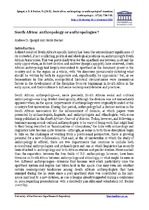| dc.contributor.author | Becker, Heike | |
| dc.contributor.author | Spiegel, Andrew D. | |
| dc.date.accessioned | 2017-07-04T14:12:17Z | |
| dc.date.available | 2017-07-04T14:12:17Z | |
| dc.date.issued | 2015 | |
| dc.identifier.citation | Spiegel, A. D. & Becker, H. (2015). South Africa: anthropology or anthropologies? American Anthropologist, 117(4): 754-760. | en_US |
| dc.identifier.issn | 0002-7294 | |
| dc.identifier.uri | http://hdl.handle.net/10566/3043 | |
| dc.identifier.uri | http://dx.doi.org/10.1111/aman.12353 | |
| dc.description.abstract | A direct result of South Africa’s specific history has been the extraordinary significance of its contested, if not conflicting, political and ideological positions on anthropology’s South African trajectories. This was particularly true for the apartheid era between 1948 and the early 1990s when, as Robert Gordon and Andrew Spiegel (1993:86) have observed, South African anthropology had largely succumbed to apartheid as the dominant power in the country and in the region as a whole, with “its discourse perniciously dictating what should be written by both its supporters and, significantly, its opponents.” Yet, as we demonstrate in this article, sociopolitical historical circumstances were momentous factors in the development of the discipline from its beginnings in South Africa in the early 1920s, and they continue to influence contemporary debates and practices. | en_US |
| dc.language.iso | en | en_US |
| dc.publisher | American Anthropological Association | en_US |
| dc.rights | This is the author-version of the article published online at: http://dx.doi.org/10.1111/aman.12353 | |
| dc.subject | Anthropology | en_US |
| dc.subject | South Africa | en_US |
| dc.subject | Apartheid | en_US |
| dc.subject | Contemporary influence | en_US |
| dc.title | South Africa: anthropology or anthropologies? | en_US |
| dc.type | Article | en_US |
| dc.privacy.showsubmitter | FALSE | |
| dc.status.ispeerreviewed | TRUE | |

